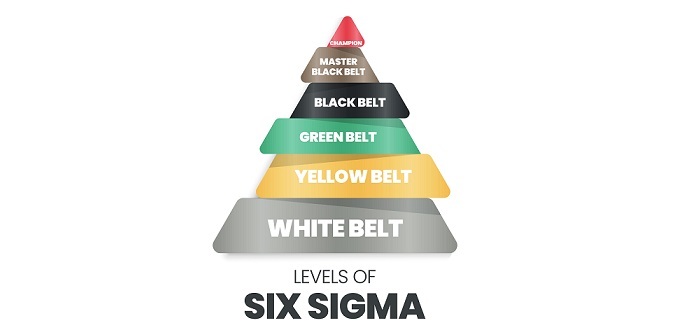
 Data Structure
Data Structure Networking
Networking RDBMS
RDBMS Operating System
Operating System Java
Java MS Excel
MS Excel iOS
iOS HTML
HTML CSS
CSS Android
Android Python
Python C Programming
C Programming C++
C++ C#
C# MongoDB
MongoDB MySQL
MySQL Javascript
Javascript PHP
PHPPhysics
Chemistry
Biology
Mathematics
English
Economics
Psychology
Social Studies
Fashion Studies
Legal Studies
- Selected Reading
- UPSC IAS Exams Notes
- Developer's Best Practices
- Questions and Answers
- Effective Resume Writing
- HR Interview Questions
- Computer Glossary
- Who is Who
Six Sigma Black Belt: What It Takes to Achieve This Level of Certification
Introduction
A significant authentication that signifies expertise and influence in the enhancement of processes is the Six Sigma Black Belt. Organizations work to attain superior operations by minimizing errors and variances in the cutthroat commercial environment of today. Data-driven technique Six Sigma provides a potent structure for attaining this objective.
The Black Belt certification, which is considered to be the top tier in the Six Sigma structure, is given to those who have the abilities, know-how, and practical knowledge to significantly enhance processes. This essay examines the qualifications and qualities needed to obtain the prestigious Six Sigma Black Belt certification, emphasizing the passion and perseverance needed to succeed in this area of competence.

For organizations to succeed in today's cutthroat business environment, reliability and procedures improvement are essential. The Black Belt certification is a sign of experience and expertise in enhancing processes within the Six Sigma structure. In this article, the prerequisites and qualities for earning the prestigious Six Sigma Black Belt certification are examined, emphasizing the commitment, expertise, knowledge, and experience needed to reach this level of competence.
The Role of a Six Sigma Black Belt
A Six Sigma Black Belt plays a significant role in an organization, acting as the main proponent of projects for enhancing processes. They are essential in directing and carrying out Six Sigma initiatives, which emphasize improving quality, lowering imperfections, and boosting operational effectiveness. An outline of a Six Sigma Black Belt's main duties and responsibilities is provided below −
Project Leadership − Six Sigma Black Belts are in charge of creating project boundaries, establishing specific objectives, and finding ways to improve as part of their role as managers of projects. During the course of a project, they lead and inspire teams from various departments, ensuring that they are aligned with organizational objectives and promoting success.
Process Investigation and Enhancement − To locate the main reasons for inefficient processes, Black Belts apply their experience in analysis of statistics, mapping processes, and data-driven choices.
Change Management − Black Belts serve as catalysts for change, promoting the organization-wide acceptance of new procedures and methods. They work together with various kinds of participants to handle objections to change, share information on the project, and foster an environment of perpetual enhancement.
Training and Mentoring − Black Belts frequently train and coach Green Belts as well as other team members who are engaged in enhanced process activities. They offer their expertise in Six Sigma concepts, methods, and technologies to provide the company with a solid basis in improving its processes
Performance Measuring − Black Belts are in charge of creating measures and indicators of performance (KPIs) in order to monitor development and assess the efficacy of change programmes. To convey project results and their effect on business results, they create based on information reports and visualizations.
Organizational Strategy − To match Six Sigma initiatives with tactical objectives, Black Belts collaborate extensively with managerial staff and leaders. They aid in the creation and application of an organization-wide Six Sigma strategy, guaranteeing the most crucial components are the focus for enhancement initiatives
As a result, a Six Sigma Black Belt's responsibilities include leading projects, analyzing processes, managing change, providing guidance and instruction, measuring efficiency, and aligning strategic goals. Black Belts generate process changes, provide quantifiable outcomes, and add to the ultimate profitability and competitiveness of the organization by utilizing their knowledge and abilities.
Requirements for Six Sigma Black Belt Certification
The Six Sigma Black Belt certification requires a particular degree of proficiency and expertise, as well as the fulfillment of specified requirements. The typical requirements for acquiring the certification are briefly summarized as follows −
Involvement in Process Improvement − Prior involvement in process improvement efforts is often needed of applicants aiming to earn Six Sigma Black Belts. This knowledge serves as a basis for properly comprehending and putting Six Sigma ideas to use.
Basic Awareness of Statistical Principles − To successfully complete the Black Belt certification, you must have a solid grasp of statistical principles. The principles of probability, hypothesis testing, regression examination, control charts, and computational capacity should be acquainted to applicants.
Training and Education − Candidates must successfully finish a thorough training course covering the concepts and practises of Six Sigma, statistical analytical methods, project management, and leadership abilities. Candidates who complete this training programme will be given the abilities as well as expertise needed to effectively lead Six Sigma initiatives
Project Knowledge − Applicants must be able to use Six Sigma tools as well as concepts in practical situations. To achieve this, one or more initiatives that result in significant procedure changes and tangible business advantages are often completed. To find tasks, set goals, analyze data, and put ideas into action, applicants collaborate extensively with mentorship and sponsors of projects.
Written Test − To show that they have a thorough knowledge of Six Sigma principles, techniques, and technologies, applicants for many certification programmes have to clear a written test
Leadership Qualities − Black Belt aspirants have to exhibit a high level of leadership. They should be able to supervise teams across divisions, communicate clearly, persuade participants, and promote organizational transformation.
The Six Sigma Black Belt certification is offered by a variety of organizations; thus it is vital to be aware that exact certification criteria may change. However, the aforementioned qualifications give a broad overview of the essential conditions normally needed to earn this prestigious certification.
The Black Belt Mindset
A crucial mentality for successfully leading process improvement efforts and generating long-lasting benefits is required of a Six Sigma Black Belt in addition to technical abilities and expertise. Some essential qualities and traits that make up the black belt mindset include −
Orientation Towards Problem-addressing − A Black Belt is driven by an unwavering emphasis on addressing issues. They are driven to find the roots of problems and come up with workable remedies since they are naturally curious. They have a methodical, scientific attitude while solving problems, and they use information as well as mathematical techniques to arrive at wise choices.
Data-Driven Decision-Making − Black Belts are aware of the value of arriving at being driven by data judgments as opposed to making them based on feelings or prejudice. They are skilled in gathering, processing, and comprehending data to understand how processes are performing and come to wise judgments.
Results-Orientation − Black Belts are driven by a focus on producing quantifiable results. To guarantee the achievement of projects, they set high standards, create key indicators of performance, and keep track of developments. They are responsible for producing quantifiable gains in client fulfillment, productivity, and safety.
Conclusion
The most advanced degree of knowledge in improving processes and quality control is represented by the Six Sigma Black Belt certification. This credential can only be obtained by a mix of in-depth instruction, real-world experience, and a dedication to continuing education. Black Belts are key players in organizations, guiding strategic efforts and bringing about significant advances.
They became change facilitators, helping organizations stay relevant and provide their clients with higher value since they have the appropriate abilities, expertise, and mentality. The demand for Six Sigma Black Belts is expected to increase as businesses continue to value operational efficiency, making this qualification extremely beneficial for people looking to have a big effect on their organizations and career.

